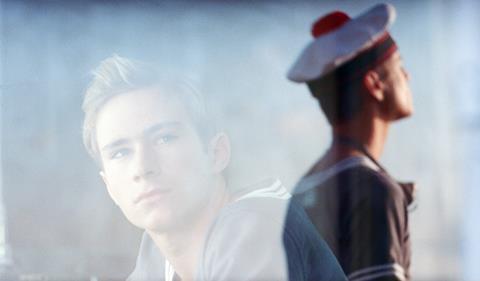Dir/scr: Marion Hansel. Belgium-France-Germany. 2010. 92mins

French sailors in the Pacific struggle with the crises of young adulthood against the background of the country’s nuclear testing programme in Marion Hansel’s thoughtful, atmospheric but over-literary Black Ocean.
Black Ocean has some memorable scenes, and unconditional sympathy for its characters.
The best thing about the film is the way it conveys the sense of these young mens’ lives suspended between sky and sea, and between past and future, in a world where atomic testing suggests a different balance – that of terror. The chief weakness of this war story without a war – which is based on two short stories by Hubert Mingarelli – is the staginess of some of the dialogue: certain passages would sound over-written even in the theatre.
The debate about whether the Mururoa tests were justified, and what the fallout was in terms of the lives and health of those who participated, still rages in France. And despite the fact that the tests are only the backdrop of this coming-of-age story, this peg will give Noir Ocean more of a guaranteed theatrical platform in France and French-speaking territories. Abroad, festival slots in Venice (in the Venice Days sidebar) and Toronto will stir some interest, but the film’s dramatic sluggishness will put off many potential distributors.
Apart from a short, initially unexplained prologue in which a young boy wades a river to bury a casket under a tree, the story is almost entirely set on board a French naval vessel in the South Seas in the early 1970s, as a group of young navy recruits – dressed in twee uniforms that seem designed for younger boys – keep watch, play cards, provoke and befriend each other, and wait for the big bang. Three emerge narratively from the pack.
Massina (Robin) has a willowy appearance, with his slender frame and pale complexion, but he turns out to be the most well adjusted and resilient of the three. He has become the designated minder of the ship’s stray dog, Giovanni – the recipient of, and excuse for, some monologues that add little to our understanding of Massina’s character.
With his crew-cut hair and athletic appearance, Moriaty (Jolivet) – whose homosexuality is only hinted at in this winsomely innocent fable – seems like a tough guy but actually he’s the most sensitive of the three, prone to sudden bouts of existential anger and despair. Chubby Da Maggio (David) gets picked on by bullies, but he’s no angel himself, with something sly and emotionally manipulative about the way he attaches himself to the two friends as the sometimes tolerated, sometimes banished hanger-on.
We only get the most slender scraps of backstory. We don’t really know whose parents are rich and whose are poor, or why these boys signed up. Officers are present but absent at the same time, more distant figures of authority than surrogate parents. Glaring daylight and dark night scenes alternate, and after an unpromising start the film builds an uneasy rhythm that reflects its theme of lives in balance – an atmosphere also stoked by the constant rumbles and drone of the ship.
Black Ocean has some memorable scenes, and unconditional sympathy for its characters. But in the end it pushes the poetic, elegiac button too hard: if only the director had shown more, and told less.
Production companies: Man’s Films Productions, ASAP Films, Neue Pegasos Film
International sales: Doc & Film International, www.docandfilm.com
Producers: Marion Hansel, Cedomir Kolar, Ernst Szebedits
Cinematography: Jan Vancaillie
Production design: Thierry Leproust
Editor: Michele Hubinon
Music: Rene-Marc Bini
Website: www.noirocean.be
Main cast: Nicolas Robin, Adrien Jolivet, Romain David, Nicolas Gob





















